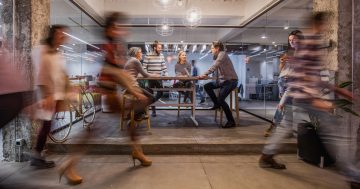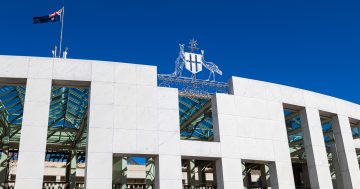
Australian Public Service Commission chief negotiator Peter Riordan says not to expect a further revised pay offer. Photo: Supplied.
A new bargaining date has been added to the Australian Public Service negotiations schedule, with hopes of reaching a final agreement over APS-wide pay and conditions.
Thursday, 28 September, has been set aside to finalise details of the package the Federal Government is offering Commonwealth employees for the workforce’s next enterprise agreement.
The Australian Public Service Commission’s chief negotiator Peter Riordan will determine if employee representatives support the package.
Uncertainty surrounds the sector’s response to the pay rise on offer.
The APSC has upped its offer from 10.5 per cent over three years to 11.2 per cent over the same period.
The Community and Public Sector Union wants a 20 per cent increase over three years.
The Australian Services Union has described the offer as “inadequate” and the Greens are saying the government should give its workforce the 20 per cent the CPSU has requested.
The CPSU is withholding comment on the package until its membership has voted.
It has been at the negotiating table throughout the whole process and has secured wins on other conditions, signalling to its members in the latter stages of negotiations that the package was about much more than pay rises.
Significant improvements to paid parental leave, pay parity across agencies, and flexible working arrangements all form part of the package.
Mr Riordan is going all out to persuade APS employees that the deal is good for them, involving a 4 per cent rise in March next year, followed by a 3.8 per cent in 2025 and 3.4 per cent in 2026.
“Importantly, the improved pay offer significantly lifts the pay of your lowest paid colleagues at each classification and begins the work to build a fairer APS, no matter the agency you work in,” his update to the workforce states.
“This impacts you and every APS employee in a very positive way. It allows you to start pursuing career options across the APS based on your skills and preferences rather than making career decisions based on different APS pay scales …
“We sought advice from the Department of Treasury, Department of Finance and considered many external economic indicators that ultimately determined your pay offer. The improved pay offer exceeds the Wage Price Index and Consumer Price Index forecasts over the life of the agreement.”
The update also points out that the pay offer will benefit from compound interest over the three years, meaning the final salary will actually be 11.6 per cent higher – even higher if salary progression or base salary structure uplifts apply to specific pay scales.
The APSC is also at pains to point out that unions have greatly influenced the composition of the package on offer, and that the government believes the pay rises to be final.
“Although the improved Commonwealth pay offer does not match some claims from employee bargaining representatives, their arguments put to the chief negotiator led to an adjusted pay offer,” its statement says
“The chief negotiator does not expect any further increases to the pay offer will be made during the current bargaining round.”
Original Article published by Chris Johnson on Riotact.











